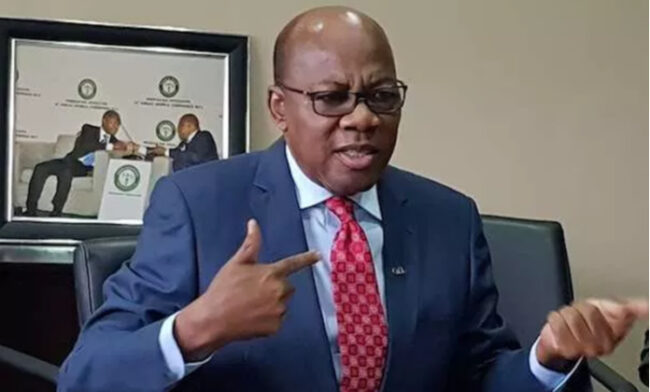Worried by Nigeria’s economic challenges, Human Rights Lawyer and Senior Partner, Olisa Agbakoba Legal, Dr. Olisa Agbakoba SAN, has called on the Federal Government to adopt what he termed the “Development Oil” model to enhance the oil and gas resources for national development.
Besides, he called on President Bola Tinubu to inject an N100 trillion marshal plan into the economy to address the current economic challenges.
Speaking in Lagos on “Rethinking Nigeria ‘s Oil and Gas Governance,” Agbakoba explained that the proposed “Development Oil” approach, reimagined the role of oil and gas resources in national development, moving it beyond mere extraction and revenue sharing to leveraging assets as catalysts for comprehensive economic development.
By adopting this new model, he explained that Nigeria will be able to transform its natural wealth into a powerful engine for sustainable development, improved infrastructure, and enhanced living standards for its citizens.
He decried the situation where the country continues to grapple with the paradox of plenty, manifested in high poverty rates, inadequate infrastructure, and uneven economic development, despite vast oil and gas resources.
He condemned the current oil and gas model in Nigeria, which he described as “Contract Oil”, saying it was primarily implemented by Joint Ventures (JVs) and Production Sharing Contracts (PSCs) for decades, adding that under the model, oil and gas are treated as commodities to be extracted, sold and profit shared between the government and IOCs.
“This narrow focus often overlooks the broader potential of these resources for national development. In most JVs and PSCs, Nigeria, represented by NNPC, is the non-operating, passive partner. This arrangement significantly limits Nigeria’s control over its own resources,” he said.
He added that the current system of JVs and PSCs, originally justified by a lack of funds, now appeared to violate the inherent rights of Nigerians over their natural resources.
By adopting a “Development Oil” approach, he expressed hope that Nigeria would reclaim control over its vital oil and gas sector and transform it into a powerful engine for national development.
However, he expressed that the paradigm shift would require bold policy changes, including the securitization of oil reserves through a Sovereign Oil Fund, which would allow Nigeria to finance its own oil and gas operations.
“It also calls for a re-evaluation of existing agreements with IOCs that have effectively outsourced decision-making and control over Nigerian resources,” he said
The current exit of IOCs, Agbakoba said has presented both a challenge and an opportunity for new Nigerian actors in the oil and gas sector.
In collaboration with the federal government, he said these actors would be able to rise to the occasion and build a new strategy for oil and gas exploration based on development oil principles.
“By aligning the oil and gas sector with broader national interests and constitutional obligations, Nigeria can create a more diversified, resilient, and prosperous economy that truly benefits all its citizens.
“This approach not only promises economic growth but also reaffirms Nigeria’s sovereignty over its natural resources, ensuring that they are managed for the welfare and security of all Nigerians, as mandated by the constitution, ” the senior advocate of Nigeria said.
He called for an immediate overhaul of the current legal framework, while a new framework should be put in place to benefit Nigerians.
Indirectly, he is calling for the repeal of the Petroleum Industry Act (PIA), saying some of the provisions are in conflict with the Nigerian Constitution.
“Draft new legislation that aligns with the “Development Oil” approach, adding that emphasis should be on the use of oil and gas resources for national development.
On the suggested N100 trillion Mashal plan, he said it would pull Nigeria out of its current economic situation.
He lauded President Bola Tinubu for recent initiatives such as the Accelerated Stabilization and Advancement Plan aimed at injecting N2 trillion into the economy over six months to mitigate the impact of the removal of fuel subsidies and the liberalization of the foreign exchange market.
Agbakoba said that despite the good intentions of the President, the N2 trillion was too small to carry out what needed to be done to pull Nigeria out of economic challenges, not limited to general inflation, food inflation, volatile forex, high poverty rate, inadequate infrastructure and uneven economic development.
The Senior Advocate of Nigeria said the measures by the president fell short of the comprehensive reform needed to resolve Nigeria’s deep-seated economic challenges.
“Nigeria needs a bold, visionary approach comparable to the New Deal of Franklin D. Roosevelt during the Great Depression and Marshall Plan for Europe’s post-World War II reconstruction.
“A N100 trillion marshal plan for Nigeria could be the catalyst for transformative change, but its success hinges on a fundamental shift in governance priorities,” Agbakoba said.
To really actualize the N100 trillion Mashal plan, he explained that the oil and gas sector, as the most lucrative of Nigeria’s 44 major natural resources, must be at the forefront of the transformation.
He said: “It is crucial to remember that Section 44(3) of the Nigerian Constitution states that, the Federation of Nigeria owns all natural resources and is mandated to use those resources for the welfare and security of Nigerians.
“The current reality, reflected in the 133 million multi-dimensionally poor Nigerians, starkly contrasts with this constitutional obligation.”
